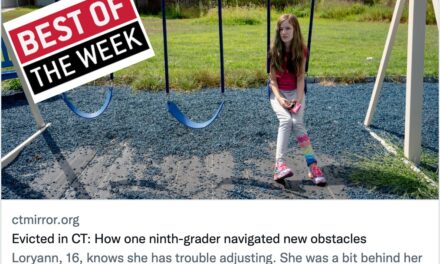What if Slack is the future of the social web? https://t.co/jpTsmv82AS pic.twitter.com/VPAbO3uhLd
— The Atlantic (@TheAtlantic) June 21, 2016
Kudos to the Washington Post for finding a way to cover the story of some Rhode Island charter school teachers caught making disparaging remarks about kids and colleagues without trying to link the story to Teach For America, the teacher prep program through which the teachers came to be at the school.
In the Washington Post piece, reporter Sarah Larimer recounts how teachers blasted parents and ridiculed students (for, among other things, misspelling the name of Ta-Nehisi Coates), and explained that the insults became public when one of the teachers’ accounts was hacked.
They were communicating using the group messaging app called Slack.
The Post isn’t the only outlet to cover the story. The Providence Journal was one of the first. Others that have piled on for the page views since then include Jezebel and the AP/Boston Globe.
Teach for America confirmed that the three teachers who resigned from BVP are TFA members, and they have been suspended from TFA.
— Linda Borg (@lborgprojocom) June 22, 2016
On Twitter, Providence Journal education reporter Linda Borg highlights TFA role in Rhode Island charter school teacher mess.
Some outlets, including EdWeek, decided that the story should focus on Teach For America — based at least in part on the connection made by Diane Ravitch.
A staunch TFA critic (at least since her change of convictions several years ago), the Ravitch post is headlined: Three TFA Teachers Removed for Texting Disparaging Comments about Students.
According to the EdWeek blog post bylined by EdWeek’s Madeline Will, “TFA critics have seized on the incident to slam the organization for what they say is inadequate training. Diane Ravitch, the education writer and activist, wrote on her blog that “no experienced teacher would have done something so stupid.”
Will notes that “it’s difficult to attribute this incident to a systemic flaw within TFA’s model” given the innumerable incidents of teachers misbehaving on social media.
And yet, the headline and much of the story focus on TFA — an organization about which I believe too much media coverage has been produced lately, in unreasonably critical terms. So why make the connection?
Ravitch and TFA go unmentioned in the Washington Post version.
As for the Blackstone Prep situation, some fresh angles with which an education reporter could approach the story include possibilities including (a) White teachers’ problematic attitudes towards students and families from different backgrounds, (b) Slack as the new teachers’ lounge, (c) Internet shaming in the age of social media.
Related posts: Shut Up About Harvard (And TFA, Charters, Closings); Anonymous Potshots, One-Sided Speculation, Lack Of Context.
ABOUT THE AUTHOR

Alexander Russo
Alexander Russo is founder and editor of The Grade, an award-winning effort to help improve media coverage of education issues. He’s also a Spencer Education Journalism Fellowship winner and a book author. You can reach him at @alexanderrusso.
Visit their website at: https://the-grade.org/













